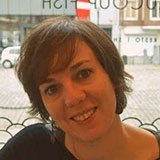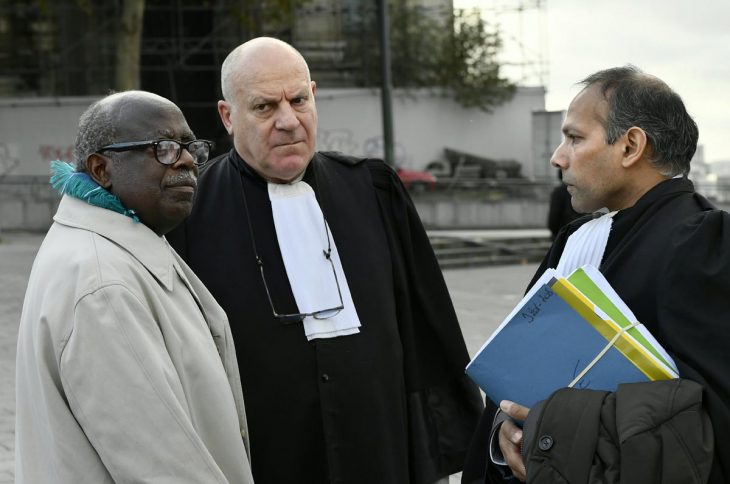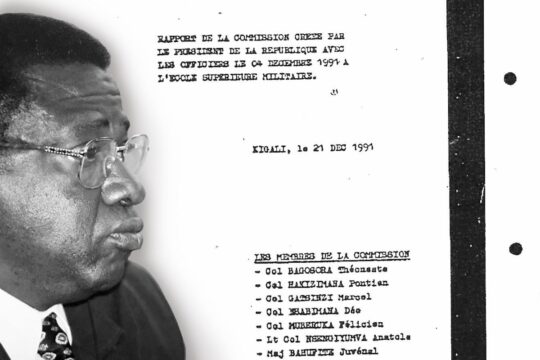In mid-April 1994, Fabien Neretse, his wife and children left the Rwandan capital Kigali. They went to Mataba, the accused's native village, where he owned another house. Neretse was well known and appreciated there. The agricultural engineer had invested significant sums to develop the commune. "It appears from the testimonies gathered there that the accused was seen as a benefactor,” explained one of the Belgian investigators. “Thanks to him, the inhabitants had seen the arrival of the school, the health centre, and so on. When Neretse returned to Mataba, he was like a lord of the land."
On a date that some say was mid-April and others the end of April, all the inhabitants were invited to a meeting at the Mataba primary school with the prefect of Ruhengeri, the sub-prefect of Busengo and the mayor of Ndusu (the municipality to which Mataba belonged). The latter, according to many witnesses, urged residents to denounce the "inyenzi" (cockroaches, meaning the Tutsi) and demolish the homes of those who had been killed in the early days of the genocide. It was a starting point for a new wave of massacres in the commune, and the court asked the witnesses from Mataba many questions to clarify the role that Neretse played.
Was the population urged to hunt down Tutsis?
The witnesses, sitting at a table opposite the court president between jurors and lawyers, vowed to tell the truth. They began their stories, which were translated from Kinyarwanda into French. The witnesses all said that Neretse did not speak at the meeting. But some say he stood on the stage alongside the prefect, sub-prefect and mayor, while others say he sat "among the population" or "as a mere member of the population".
The accused denies that this meeting was used to fuel conflict. The sub-prefect of Busengo, heard by videoconference, also contested that allegation. "This meeting was convened by the newly appointed prefect [Basil Nsabumugisha, now deceased] to introduce himself to the population,” said the former senior official, who is currently serving a life sentence for his involvement in the genocide. “He also had to communicate the actions he was going to take and inform people about safety. The residents had to ensure their own safety by fighting infiltration [by RPF members]."
Several witnesses told the court rifle shots were heard at the meeting. "Neretse said that we had nothing to be afraid of because those firing were his agents," said one witness, a former Mataba farmer who confessed to three murders and was sentenced in 1996 to 13 years in prison, before being released in 2003. "I started getting involved in the massacres after we were called to the meeting. I had been elected as a representative of a cell in the Mataba sector. I had to identify the places where the Tutsis were hidden, otherwise I would have been killed myself," he said.
Did the school guards become militia?
Who fired those shots? Who owned weapons in Mataba? The court then moved to the second stage of its questions to the witnesses. Federal Prosecutor Arnaud d'Oultremont alleges that the two weapons distributed to the village of Mataba by the Area Counsellor (who was Neretse's brother) before the genocide began were in the hands of guards at the ACEDI-Mataba secondary school, founded by Neretse in 1989.
According to the accused, these guards were hired in 1993 following attacks on Tutsi students by Hutu students, and they continued their task of protecting the Tutsi minority within the school until the end of the war. But the prosecutor claims that these guards gradually formed an Interahamwe militia that committed numerous massacres in the Mataba area between April and June 1994, and which he claims was housed and fed either at the school or in a nearby property owned by Neretse.
The testimonies on this are more divergent. "I sometimes went to school to see my father [one of the former guards],” said a Mataba trader. “I saw new guards walking around outside the school with guns. Personally, I did not see any murders, but I heard later in the gacacas that these people killed.”
“Yes, the new guards became Interahamwe. They taught us how to use guns," said another witness. But a former Mataba teacher now living in Canada contradicted this, saying "the school guards were unarmed. At school, there were Hutus and Tutsis among both students and teachers. And the guards were there only to defend the school. Parents thought their children were safe there."
Parties to the trial had plenty of comments, calling some of the testimonies irrelevant but some also touching. The jurors, listening attentively, recorded in their notebooks. In the next two weeks they will hear more testimonies from residents of Mataba, and several direct witnesses to Mpendwanzi's abduction (see box).
THE MURDERED MAN TRANSPORTED BY NERETSE
The Interahamwe militia based in Mataba perpetrated many crimes, according to the Federal Prosecutor in Brussels, Arnaud d'Oultremont, but only two victims have been identified: Anastase Nzamwita and Joseph Mpendwanzi. The testimonies concerning Mpendwanzi's murder are quite numerous and directly involve Fabien Neretse.
Joseph Mpendwanzi, a Hutu medical assistant who was a local leader of the opposition MDR party, was kidnapped on 19 June 1994 in Nyakabanda, not far from Mataba, by Interahamwe. He was tied up in a white Toyota pickup truck driven by Fabien Neretse, according to witnesses.
The accused does not deny that he carried Mpendwanzi, his feet and hands tied in the back of his jeep. But he claims he was forced to do so by the militiamen. "I met them when I was returning to Mataba. They asked me to take them to Vuruga, 20 miles away. It was on my way. There were two or three of them," said Neretse. "I was thinking I had no power over them. I asked them to release him, but they refused.”
The body of Mpendwanzi, a 57-year-old father of ten, was never found. But the farmer convicted of three murders who now asks forgiveness offered some new evidence. According to him, the kidnappers of Mpendwanzi, the Interahamwe of Mataba with whom he had contact, told him that they had placed the victim in a bag and pushed him off a hill.
"This is a key moment for the victims," says Agathe De Brouwer, lawyer for a daughter and son of Mpendwanzi. "This is the first time my client has heard what happened to her father." But Jean-Pierre Jacques, one of Neretse's lawyers questioned the testimony. "Why does the witness say all this 17 years after his sentence and 13 years after his release from prison?” he asked. “Why didn't he tell the investigators when they interviewed him in 2013?”






